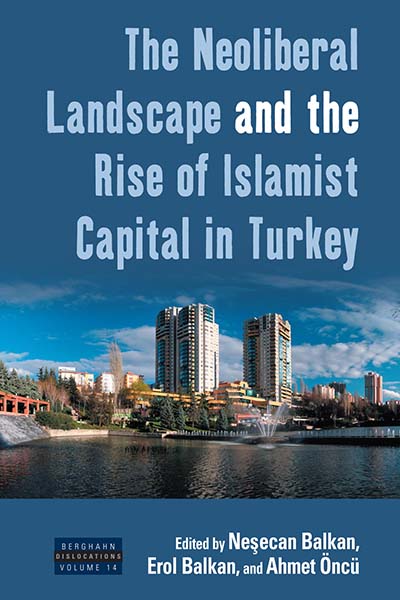“Balkan and her colleagues offer us a clear and well-documented treatise of the neoliberal globalization of Turkey under the Islamic project within the command of the Justice and Development Party (AKP) – an implicit coalition of diverse Islamic movements… a very timely contribution, not only for its relevance on its depiction of the recent neoliberal era of Turkey, but also on its new conceptualization of the key issues such as ‘middle classes’, ‘Islamic capital’ and informalization. Very timely indeed.” · Research and Policy on Turkey
“This is a strong and important collection. The unifying thesis throughout refers to the ascendancy of a specifically Turkish form of Islamic capitalism. The main emphasis throughout concerns the contested character of this ascendancy at the highest levels of Turkish state and society. These are important and intimately interwoven themes… The collection leaves a clear impression that the roots of the recent battles over Taksim Square run deep; their implications will continue to simmer throughout the country. Nothing has been resolved.” · Sidney Plotkin, Vassar College
Islamist capital accumulation has split the Turkish bourgeoisie and polarized Turkish society into secular and religious social groupings, giving rise to conflicts between the state and political Islam. By providing a long-term historical perspective on Turkey's economy and its relationship to Islamism, this volume explores how Islamism as a political ideology has been utilized by the conservative bourgeoisie in Turkey, and elsewhere, to establish hegemony over labor. The contributors analyze the relationship between neoliberalism and the political fortunes of the Islamist Justice and Development Party (AKP), and examine the similarities and differences amongst new factions in the secular and Islamic middle class that have benefited economically, socially, and culturally during the AKP's reign. The articles also investigate the impact of the Gülen Movement and the role of the media in shaping the contours of intra-class struggle within contemporary Turkish political and social life.
Neşecan Balkan is a Senior Lecturer of economics at Hamilton College. She is the author of Capitalism and the Debt Crisis, published in Turkish in 1994, and co-editor with Sungur Savran of The Ravages of Neo-Liberalism: Economy, Society and Gender in Turkey (2002) and The Politics of Permanent Crisis: Class, Ideology and State in Turkey (2002).
Erol Balkan teaches economic development, international finance and political economy of the Middle East at Hamilton College in New York. Balkan’s book on the formation of the Turkish middle class and education, Reproducing Class: Education, Neoliberalism, and the Rise of the New Middle Class in Istanbul, was published in 2009 by Berghahn Books.
Ahmet Öncü is Professor of sociology at the Sabancı University School of Management. His articles have appeared in journals such as New Perspectives on Turkey, Journal of Historical Sociology, Cultural Logic, Science and Society, Citizenship Studies, International Review of Sociology, and Review of Radical Political Economics.
LC: HC492.N4613 2015
BL: DRT ELD.DS.152146
BISAC: POL023000 POLITICAL SCIENCE/Political Economy; BUS069000 BUSINESS & ECONOMICS/Economics/General
BIC: KCS Economic systems & structures; KCP Political economy


